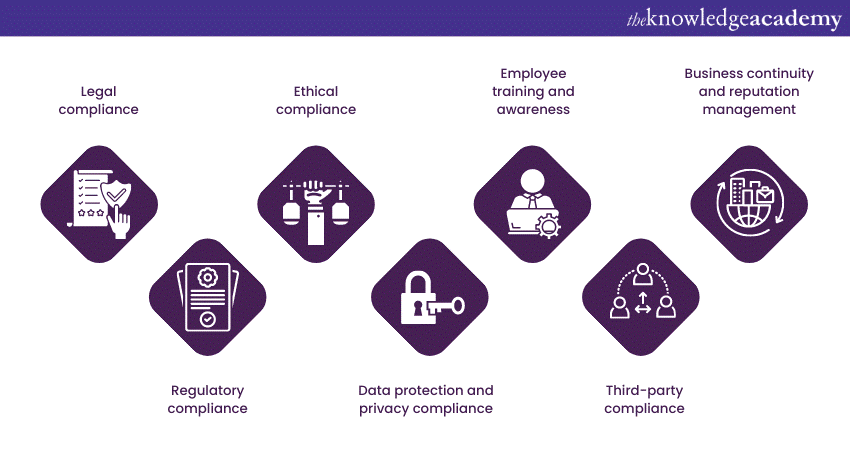We may not have the course you’re looking for. If you enquire or give us a call on +61 1-800-150644 and speak to our training experts, we may still be able to help with your training requirements.
Training Outcomes Within Your Budget!
We ensure quality, budget-alignment, and timely delivery by our expert instructors.

Compliance refers to the act of following the legal, regulatory, and ethical standards that apply to business operations. The Importance of Compliance for businesses cannot be overstated as it helps them avoid legal troubles, maintain a good reputation, and earn the trust of their stakeholders.
The Thomson Reuters Cost of Compliance 2022 report, revealed that Fintech and Climate change risk assessments were among the most challenging areas for Compliance, accounting for up to 60 per cent of the top difficulties. Organisations, now more than ever must prioritise Compliance to safeguard their reputation, protect against legal risks, and foster stakeholder trust. Discover the Importance of Compliance for businesses and take advantage of the rationale behind the many rules and regulations. Read along to learn more!
Table of Contents
1) Understanding Compliance in a Nutshell
2) Exploring the types of Compliances and their importance
a) Legal Compliance
b) Regulatory Compliance
c) Ethical Compliance
d) Data protection and privacy Compliance
e) Financial Compliance
f) Internal controls and Risk Management
g) Employee training and awareness
h) Third-party Compliance
i) Business continuity and reputation management
3) Conclusion
Understanding Compliance in a Nutshell
Compliance is the act of an organisation conforming to laws, regulations, standards, and best practices relevant to the industry. It ensures that businesses operate within the boundaries of legality and ethics, safeguarding the interests of various stakeholders.
Additionally, Compliance promotes transparency, accountability, and fairness in business practices, enhancing the reputation and credibility of an organisation. Companies must comply with relevant guidelines to establish trust with customers, investors, employees, and regulatory authorities.
Furthermore, the impact of an organisation not complying properly with regulations can be severe and far-reaching. Non-Compliance can lead to legal repercussions, including fines, penalties, and lawsuits. It can damage the organisation's reputation, erode customer trust, and result in the loss of business opportunities.
Moreover, non-compliant practices may also disrupt operations, hinder growth, and negatively impact employee morale. Regulatory authorities may also impose additional scrutiny and monitoring on non-compliant organisations, resulting in increased costs and decreased flexibility.
Therefore, organisations must recognise the importance of Compliance and successfully navigate the complex business landscape. Successful navigation promotes integrity, transparency, and responsible business practices, positively impacting society and the environment.
Exploring the types of Compliances and their importance
Compliance is the process of following the legal, regulatory, and ethical standards that apply to business operations. Any business irrespective of its size has to follow a list of Compliances, given below is a list of the same coupled with the reasons why they’re important:

a) Legal Compliance
Legal Compliance forms the foundation of any robust Compliance program. It involves adhering to local, regional, and international laws governing various business operations.
Additionally, complying with legal requirements helps organisations avoid costly penalties, lawsuits, and reputational damage. Moreover, it ensures fair competition, protects consumer rights, and maintains a level playing field within the industry.
b) Regulatory Compliance:
Organisations must also comply with specific industry regulations and standards, in addition to legal obligations. Government agencies, industry bodies, or professional associations may impose these regulations.
Additionally, regulatory Compliance is essential to maintain operational integrity, data security, environmental sustainability, and public safety. Companies must adhere to regulatory guidelines, thereby demonstrating their commitment to responsible business practices and mitigating Compliance risks.
c) Ethical Compliance:
Ethical Compliance focuses on conducting business with integrity, honesty, and fairness. It involves adhering to ethical standards and codes of conduct that define acceptable behaviour within an organisation.
Additionally, demonstrating ethical Compliance helps build trust with stakeholders, including employees, customers, and partners. It ensures that organisations prioritise social responsibility, sustainability, and respect for human rights in their operations.
d) Data protection and privacy Compliance:
The protection of data and privacy Compliance have gained significant importance in the era of increasing digitalisation. Organisations must comply with data protection regulations, such as the General Data Protection Regulation (GDPR), to safeguard personal information and prevent data breaches.
More importantly, Compliance in this area ensures that customer data is handled securely, enhancing customer trust and mitigating the risks of reputational damage resulting from data mishandling.
Acquire a better understanding of Effective Compliance by signing up for the Effective Compliance Training now!
e) Financial Compliance
Financial Compliance pertains to adhering to accounting standards, financial reporting requirements, and tax regulations. Compliance in this area ensures accurate and transparent financial records, facilitates sound decision-making, and builds investor confidence.
Organisations must comply with financial regulations, thereby avoiding any legal consequences, reputational damage, and financial losses due to Non-Compliance.
f) Internal controls and Risk Management
Compliance frameworks often include internal controls and Risk Management processes. Effective internal controls ensure that operational activities are conducted consistently and controlled.
Additionally, Risk Management helps identify potential threats and implement measures to mitigate them. Compliance in these areas reduces the likelihood of fraud, corruption, and operational disruptions while promoting efficiency and accountability.
g) Employee training and awareness
An organisation's Compliance program is only effective if employees understand and embrace it. Comprehensive training and awareness programs educate employees about Compliance policies, procedures, and their role in upholding them.
Organisations benefit immensely from training their employees, fostering a culture of Compliance, reducing the risk of inadvertent violations, and encouraging proactive identification and reporting of Compliance concerns.
h) Third-party Compliance
Organisations often work with third-party vendors, suppliers, and partners who must also comply with relevant regulations and standards. Ensuring third-party Compliance is essential to mitigate risks associated with non-compliant actions of external entities.
Furthermore, robust due diligence, regular monitoring, and clear contractual agreements help maintain Compliance throughout the supply chain, protecting the organisation from potential legal, reputational, and operational issues.
i) Business continuity and Reputation management
Compliance contributes to business continuity and reputation management. Organisations can mitigate risks and ensure their adherence to legal and ethical standards, thereby safeguarding their reputation, which is vital for attracting and retaining customers, investors, and employees.
Moreover, Compliance also aids in Crisis Management, as organisations with well-established Compliance practices are better equipped to handle unforeseen events and protect their long-term viability.
Empower Your Team: Elevate Your Security Posture with Our Comprehensive Governance and Compliance Training now!
Conclusion
Compliance ensures that organisations operate within legal, regulatory, and ethical boundaries, protecting their reputation and mitigating risks. By understanding the Importance of Compliance, organisations can identify Non-Compliance, reduce threats, and demonstrate their commitment to upholding high standards through effective Compliance monitoring.
Learn to comply with law, regulation and company policy by signing up for Compliance Training Courses now!
Frequently Asked Questions

Compliance is following the legal, regulatory, and ethical standards that apply to business operations. There are many career opportunities in Compliance, such as Compliance Officer, Compliance Auditor, Compliance Analyst, Compliance Manager, and Compliance Consultant. These roles vary in their responsibilities, skills, and qualifications, but they all require a good knowledge of the laws and regulations that affect their industry and organisation.

To effectively implement Compliance in business, you need a clear and comprehensive compliance strategy that aligns with your corporate culture and goals. Your Compliance strategy should include the following steps:
a) Define your goals.
b) Establish a functional scope.
c) Understand the regulatory environment.
d) Develop formal policies, procedures, and standards.
e) Train your employees.
f) Ensure accurate record-keeping.
g) Monitor Compliance.
h) Manage Non-compliance.

The Knowledge Academy takes global learning to new heights, offering over 30,000 online courses across 490+ locations in 220 countries. This expansive reach ensures accessibility and convenience for learners worldwide.
Alongside our diverse Online Course Catalogue, encompassing 17 major categories, we go the extra mile by providing a plethora of free educational Online Resources like News updates, Blogs, videos, webinars, and interview questions. Tailoring learning experiences further, professionals can maximise value with customisable Course Bundles of TKA.

The Knowledge Academy’s Knowledge Pass, a prepaid voucher, adds another layer of flexibility, allowing course bookings over a 12-month period. Join us on a journey where education knows no bounds.

The Knowledge Academy offers various Compliance Training, including Corporate Governance Course and Security Governance and Compliance Training. These courses cater to different skill levels, providing comprehensive insights into various Compliance methodologies.
Our Compliance Training blogs covers a range of topics related to ISO and Compliance, offering valuable resources, best practices, and industry insights. Whether you are a beginner or looking to advance your Compliance skills, The Knowledge Academy's diverse courses and informative blogs have you covered.
Upcoming ISO & Compliance Resources Batches & Dates
Date
 PCI DSS Implementer
PCI DSS Implementer
Thu 16th Jan 2025
Thu 6th Mar 2025
Thu 22nd May 2025
Thu 24th Jul 2025
Thu 25th Sep 2025
Thu 20th Nov 2025
Thu 11th Dec 2025







 Top Rated Course
Top Rated Course



 If you wish to make any changes to your course, please
If you wish to make any changes to your course, please


